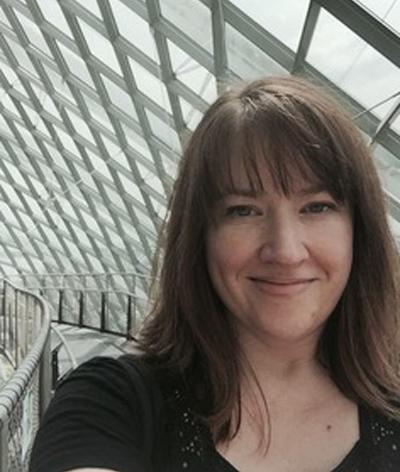
“All those things that freshman have the time to find...transfer students have to hit the ground running.”
Every transfer story is different.
Heather Simpson, for example, always knew she would transfer to the University of Washington to major in English. That journey began in Oklahoma, routed through Highline College, and took nearly a decade. Ewan Cameron, on the other hand, knew within his first quarter at Gonzaga University in Spokane that he wanted to transfer to UW as a sophomore. Trevor Little, to take another instance, weighed the options of transferring while attending a college in South Dakota, where they began to imagine Seattle as offering an environment that would be more liberal and inclusive and allow them to discover a sense of belonging: “I started to lean into the feeling deep inside myself that I was going to transfer.”
Choosing to transfer along whatever pathway, though, appears to be the easiest part of transferring to the University of Washington. Indeed, all of the transfer students I interviewed reported some degree of confusion about at least one aspect of the transfer process. From wondering about housing options to navigating the advising process to completely missing information about financial aid and scholarships, each of these students expressed a sense of being adrift at some point during the transfer process. This perceived lack of support is concerning, especially in light of a report put out by the UW Office of Educational Assessment (OEA) nearly a decade ago. This 2014 report explores undergraduate retention rates via a survey asking students about reasons they had left UW. The report found that nearly 50% of the transfer students who left did so before they completed their first year. When asked what would have helped them choose to remain at UW, the majority answered, “high quality, consistent advising.”
Many of the issues identified in this 2014 report continue to affect transfer students; most of the students with whom I spoke echoed this same desire for advising support. In looking back at the process of transferring, Ewan Cameron said that he “would have really liked to have had an academic or departmental advisor.” Heather Simpson explained that when she transferred to campus, she had to find an advisor herself. “That was pretty much up to me,” she says. “I sought out the department and got a little sheet of paper with all the English courses that were needed to graduate, and that was about it.” Trevor Little echoed this need to be proactive about seeking information, identifying a major difference between advising at their previous university and UW. “I had to seek her out,” they say. “I wasn't quite used to that because I always just had a general advisor who I could go to for everything.”
Humanities Academic Services Associate Director Nancy Sisko explains that there are orientation days designed specifically for transfer students. These transfer days are run by First-Year Programs and consist of keynote speeches, a campus tour, and individual advising and registration appointments. However, according to the transfer students I interviewed, there is an apparent misalignment between what the orientation offers and what transfer students actually need. Transfer students know the basics of college life. They know how to take classes. They are intellectually curious and inspired by the opportunities UW appears to offer them. They need to know how to navigate the system to access these opportunities. Overwhelmingly, I heard transfer students say that they needed this information to be more targeted, more practical, and more personal. Further, all the students I spoke with identified difficulties around transferring credits; most expressed frustration and surprise that they would need to retake an equivalent class at the UW in order to pursue additional coursework.
Before June 2020, Sisko was one of three academic advisors dedicated to assisting students in the English Department. She also had the opportunity to teach a two-credit course designed specifically for transfer students that was linked with ENGL 202 (Introduction to the Study of English Language and Literature) and ENGL 297 (Intermediate Interdisciplinary Writing). Sisko specifically designed the course to build a sense of community among these students in their first year at UW. “Transfer students don’t have the luxury of fumbling around for resources,” she says. She designed each class to provide transfer students with access to information and resources that are often a part of a typical freshman’s first-year experience, such as library resources, student groups, community-building opportunities, and the like. “All those things that freshman have the time to find,” she says. “Transfer students have to hit the ground running.” Recently, however, departmental advising was eliminated in favor of a centralized Humanities Academic Services center, which was set up as an umbrella advising unit for all departments in the humanities. This center, which is currently in the process of discovering ways to best serve all students in its purview, has six full-time staff members, three of whom are advisors who engage with students from all twelve departments in the humanities. At this point, the specialized two-credit course for transfer students is not being offered. Sisko is hopeful that once the transition is complete, there will be an opportunity to offer the course once again.
Not having such a specialized course for transfer students is a missed opportunity, as even with the uncertainty and ambiguity that may accompany transfer, degrees in English continue to be an attractive prospect to transfer students. In fact, since 2010, about one third of students in any given year who declare English as their major have transferred to UW, according to Sisko. A staggering rise occurred in Autumn 2020, when transfer students accounted for 41% of the English Department. Sisko explains that “many transfer students have situations that don’t lend themselves easily to the sequential nature of science courses, as an example, which often require structured courses taken in a specific order over the course of several years.” These scheduling demands may lead transfer students to choose majors in the humanities. But more positively, a degree in English or another humanities discipline is attractive to transfer students because they know that tech companies, NGOs, and businesses are looking for people who have the skills that are prioritized and developed through courses in the humanities. She says that when these companies turn to UW looking for interns and employees, hiring managers consistently ask for applicants who demonstrate skill sets that are not often taught in the sciences but are central to training in the humanities. “More and more students are hearing that an English major has value,” Sisko says. The transfer students with whom I spoke instantiated Sisko’s observations. When asked why she choose to major in English, Lissa Brewer explained that English is a solid choice because “you can build on it. It's not a dead end—it’s something that you can take in many different directions.” Heather Simpson echoed the sense of possibility that comes with majoring in English, explaining her intention to teach abroad and more: “I think I’m just scratching the surface right now.”
While every transfer story is different, shared traits seem to be required for a successful transfer experience: perseverance, resourcefulness, and an ability to find information when it is not provided. While transfer students don’t need or want anyone to hold their hand through the transfer process, they do need clearer pathways to advisors, better access to information about financial aid and other resources, and stronger articulation agreements to facilitate the transferring of credits. The students I met who chose to transfer to UW are an inspirational group; they’re intellectually curious and eager to explore their interests at UW. It was disappointing to hear, though, that these students found roadblocks on their path to becoming an integrated part of the UW community. We have an opportunity to advise and assist these transfer students as they reach their goals—and contribute their intellect and energy to stronger humanities departments in the process.
Rebecca Taylor is a Doctoral Student in the Department of English, as well as a 2020-2021 Collaborative Mellon Fellow for Reaching New Publics with Joe Wilson, who is also a Doctoral Student in the Department of English.
Rebecca Taylor (she/her/hers)
Rebecca Taylor is a Doctoral Student in the Department of English, as well as a 2020-2021 Collaborative Mellon Fellow for Reaching New Publics with Joe Wilson, who a Doctoral Candidate in the Department of English.
